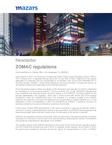
ZOMAC regulations
Last October 9, 2017, the Ministry of Finance and Public Credit issued Regulatory Decree 1650 of 2017, through which it regulates Articles 235 to 237 of Law 1819 of 2016, related to the tax regime applicable to companies that are incorporated or formalized in the "Zonas Más Afectadas Por El Conflicto Armado -ZOMAC-" (Areas Most Affected by the Armed Conflict). Through this writing, we will highlight a good and a bad aspect of the referred regulation.
The most positive aspect, without any doubt, is the clarification and regulation of what is understood by "Development of all economic activity". The text of Article 237 of Law 1819/2016 indicated that only companies that "develop all their economic activity in the ZOMACs" would be eligible for the benefits established in the regulation, which was in direct conflict with Article 333 of the Political Constitution under the understanding that if, for example, if a company located in the ZOMAC imported raw materials or services (for industries such as agriculture or related industries), or if it had distributors in other municipalities or cities not considered as ZOMAC, it would be carrying out activities outside such zones and therefore would lose the benefits.
In this sense, Decree 1650 specified that, in the case of industrial or agricultural activities, trade or services, it must be understood that the activity is exercised within the ZOMAC without prejudice that these are provided "within and from" these zones "to other parts of the country or abroad".
However, the regulation failed to mention that, under the same logic, the imports of goods or services necessary (from abroad or from the rest of the national territory) to develop their activity in the ZOMAC should also be understood as "developed in the ZOMAC".
The negative aspect of the ZOMAC regulations is the excess of the Government's regulatory power, and the unclear and anti-technical way in which it regulates certain aspects. Some issues in which the government exceeds its authority are the tax regime for reorganizations in which a ZOMAC company participates and the application of the rules of the transfer pricing regime in the operations of ZOMACs with their national related parties. For reasons of space, only the analysis of the first issue will be addressed in this column, leaving the second for a column entirely dedicated to such issue.
The government regulation, under the pretext of regulating an anti-circumvention clause in the ZOMAC regime, modifies the legal regime of corporate reorganizations contained in articles 319-3 to 319-9 of the Tax Statute. This modification, which could only have been made through an amendment to Law 1607/2012, indicates (in a very confusing and anti-technical way) that if a ZOMAC company merges, or participates as a spin-off in a spin-off operation, with another or other companies that are not in such regime, they must "liquidate the income tax rate and complementary (sic) and determine the operations at market prices", liquidating, in any case, the higher of the rates that corresponded to the companies participating in the merger or spin-off.
This reform to the tax regime for reorganizations -via regulatory decree- contravenes the whole philosophy of tax neutrality and deferral for this type of operations established in Law 1607 of 2012.
In its jurisprudence, the Council of State has said that the president, under the pretext of regulating a rule, cannot modify, expand or restrict the meaning of the law by issuing new provisions or deleting those contained therein, because this would not be regulating but legislating" (Ruling 2013-00149 of 09/19/2016 C.P. Jaime Orlando Santofimio Gamboa). This is precisely what the Government is doing with the regime of corporate reorganizations in which a ZOMAC company participates, which will undoubtedly lead to the nullity of such regulation being sued for contravening the principle of legality that governs our legal system.


